Drag Icon Charles Busch Plays a Fallen Woman in The Confession of Lily Dare
Not even an earthquake can shake her resolve.
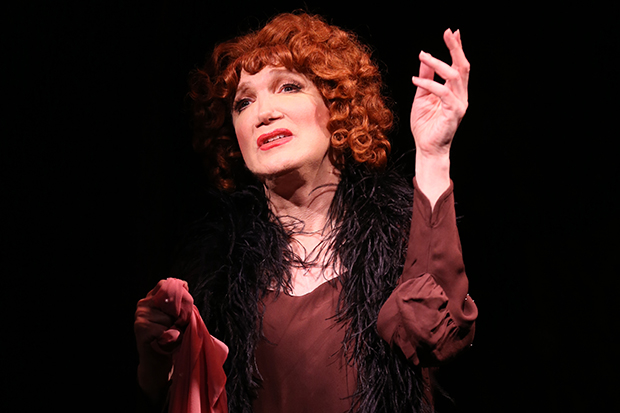
(© Carol Rosegg)
Successive American generations have aspired for their children to live better lives than themselves; and by that metric, Lily Dare is an American success story. We learn the tawdry and improbable details of her roller-coaster story in Charles Busch's The Confession of Lily Dare, now performing with Primary Stages at the Cherry Lane Theatre. It's a campy pleasure trip for lovers of old movies, and a must-see for postulants at any of New York City's many orders of drag.
Busch is one of the most enduring practitioners of that art form on the off-Broadway stage, and one of the last active playwrights of the Ridiculous Theater. Centered in the West Village (particularly around Charles Ludlam's Ridiculous Theatrical Company), that queer school of stagecraft emphasized the fun that could be had in gender-bending subversion; and it borrowed liberally from "low" forms like film and television in its quest to create hilarious, ridiculous American mythology onstage.
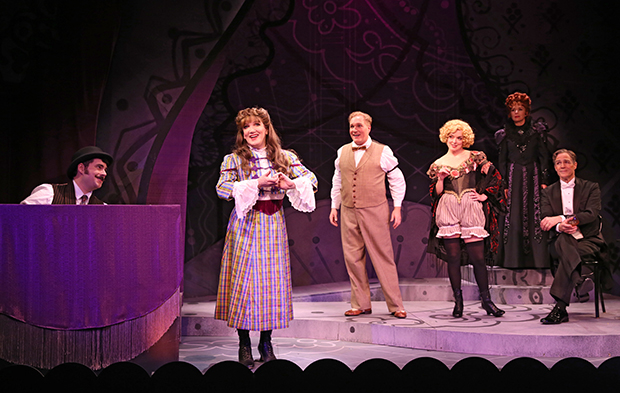
(© Carol Rosegg)
Following his last collaboration with Primary Stages, the 2014 real estate comedy The Tribute Artist, Busch returns to the kind of cinematic send-up that made him a name in the theater (shows like Vampire Lesbians of Sodom and Psycho Beach Party). Lily Dare is inspired by The Sin of Madelon Claudet (1931) and Frisco Jenny (1932), films about women who crawl across the underbelly of society as part of a great sacrifice for their children.
Of course, Lily (played by Busch) is bright and innocent when she first arrives in San Francisco circa 1906, fresh from a convent school in the Swiss Alps. She has been sent to live with her Aunt Rosalie (Jennifer Van Dyck), totally unaware that Rosalie is the proprietress of an infamous brothel. Lily falls for penniless bookkeeper Louis (Christopher Borg), but when he is killed in an earthquake, she finds herself alone and pregnant with his child. To support her family, she turns to underworld aristocrat Blackie Lambert (a sinister and charming Howard McGillin). From there she tumbles through stints as a cabaret singer, a convict, and a successful madam in her own right — all while trying to shield her daughter, Louise (Van Dyck), from the truth.
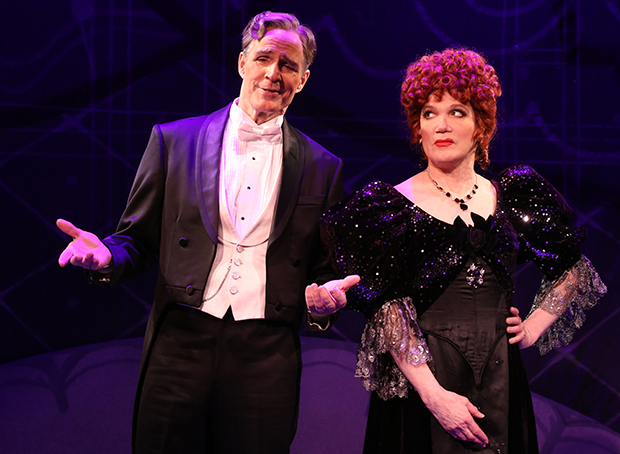
(© Carol Rosegg)
The tropes pour out of Lily Dare like a camp cumulonimbus, and that's all part of the fun. Blackie introduces himself, "I'm what is known as a shady character from a once prominent family who adds a veneer of class to whatever room he's in." Conversely, Louis describes himself as a "flea bitten Sir Galahad."
This vintage silhouette of a plot offers an ideal frame for Busch's howl-inducing one-liners. When Blackie offers Lily a Fabergé egg, she agrees to accept "a small one. To be polite." In that same scene, Blackie tricks Lily into claiming she saw a theatrical performance by an actress that doesn't exist. He chastises, "That you fell for it is an insult to all aging actresses and the Sodomites who love them."
Such lines are instant classics, and they roll off the acrobatic tongue of a performer like Busch. He luxuriates in an antiquated style of acting that is tremendously satisfying to behold. In a later scene with McGillin, we watch as disgust overtakes Busch's face, and then curdles into rage. Why bother with a close-up when Busch can bring his expression right to our seats through a contortion of the brow or curl of the lip?
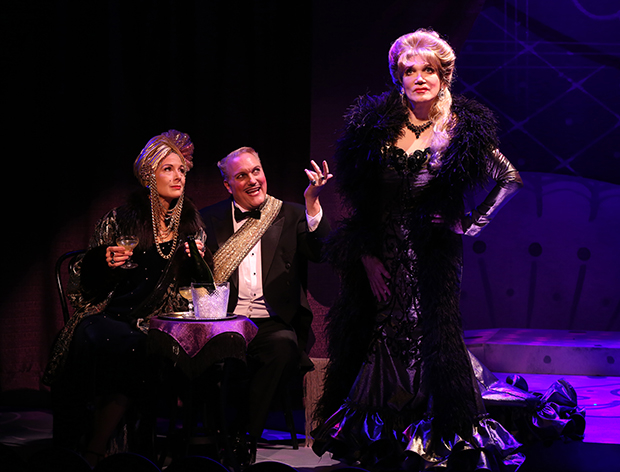
(© Carol Rosegg)
There are other memorable performances, including Borg as a grotesque Austrian count and Van Dyck as a doctor's wife who delivers an overwrought monologue about the virtues of motherhood. Kendal Sparks and Nancy Anderson provide narration as Mickey and Emmy Lou, friends of Lily who recount her life while gazing at her tombstone.
Director Carl Andress's low-tech staging brings an air of DIY theatricality to the story, starting with the beaded curtain framing the stage: Scenic designer Brian T. Whitehill has fashioned it out of translucent red plastic plates and bottles, conjuring an Edwardian brothel on a Party City budget. Rachel Townsend's imaginative costumes present a heightened version of another time (I especially loved Lily's ludicrously puffy shoulders on her madam dress). Kirk Bookman effects 1930s cinematic lighting, and Bart Fasbender underscores it all with the sound of a swelling orchestra. All that's missing is the popcorn.
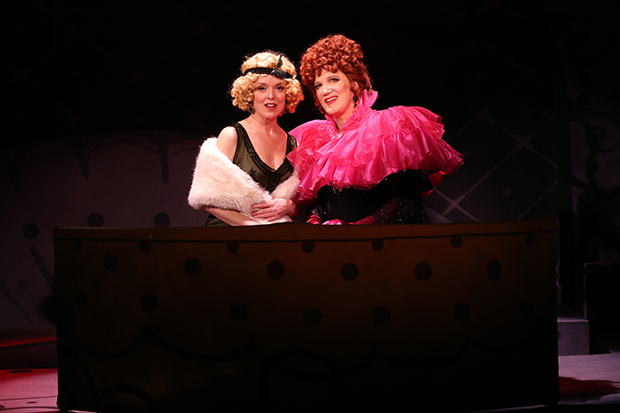
(© Carol Rosegg)
It is easy to dismiss Lily Dare (and most of Busch's work) as a nostalgia act aimed at a graying audience of gay cinephiles. And it's true that Busch's frame of reference is much closer to Bette Davis than Beyoncé. But if you choose to have postshow drinks, I highly recommend the recently opened gay bar Playhouse, just around the corner in the former Actors' Playhouse Theatre. There you are likely to encounter drag queens who were born in the '90s and are still quoting Mae West and performing tributes to Judy Garland. When so much of the mainstream culture seems to suffer from amnesia, that kind of continuity in gay culture feels priceless — and we have drag artists like Busch to thank for it.








